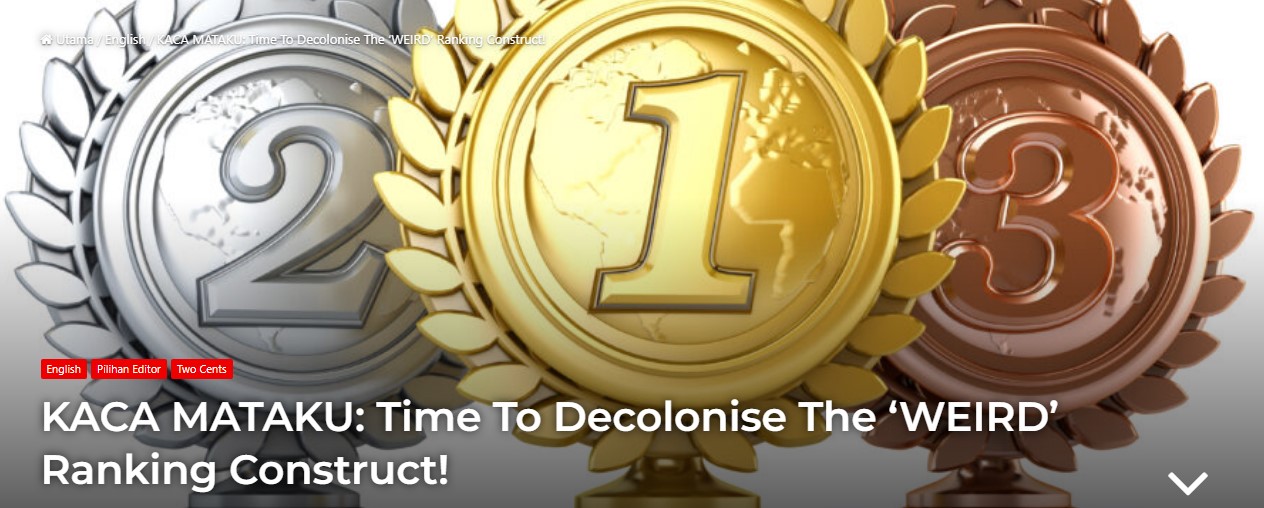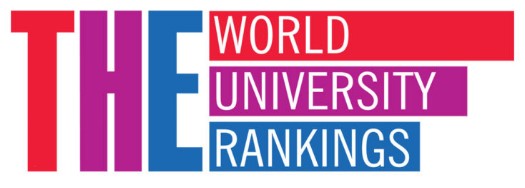Time To Decolonise The ‘WEIRD’ Ranking Construct!
Emeritus Professor Tan Sri Dato' Dzulkifli Abdul Razak
Opinion - Bacalah Malaysia
July 10, 2023

The busiest “rankers” to date are of western origin with western biases. They has somehow garnered an ‘international’ profile, cleverly camouflaging the western-centricity, not unlike the colonial times.
Traditional and indigenous education were brushed aside as inferior and irrelevant. And was substituted with a modern (read, colonial and white version) system of education.
This phenomenon takes from the Renaissance in the West where education is reduced to largely an economic imperative!
With that, the world of education instantly changed into ‘WEIRD’. Namely, being Western, and increasingly becoming White given the pervasive technology. It is also English- and Economic-centric, transforming the marketplace in conformity with the colonial life-style regardless of its inappropriateness to local cultures and values.

For example, students in modern schools are made to wear the neck-ties, unsuitable as it is in the hot and humid tropical climate. Worst still, the suit as a mark of being “highly educated,” no matter any where in the world. Again, traditional garments are looked down upon.
Along the same line, ranking emerges as an extension of the ‘WEIRD’, with the desire to dominate the university as a listening post. The industry acts as the frontline to forge the way forward on how universities should be governed and fashioned as an economic entity.
The goal is to mass manufacture human capital for the sole purpose of rooting a colonial ideology, capitalism. Eventually, universities were made appendages of the industry, geared towards livelihood and making a living, rather than learning about life and the self.
Hence, it is industry-led to boost competition, the bottom-line and profiteering! This was closely experienced during the pandemic when the link between university and the industry was severely disrupted, and suffered the unwarranted consequences. Livelihood was put on hold. And life, threatened.
The relationship between the two revolves around knowledge transfer. In particular, the publishing and book industry serves as gatekeeper in determining which articles get published and where. Ultimately, it decides on how the publication can justify the ranking exercise.

Only designated publishers and databases count. With it comes the notion of citations and internationalisation that lead to the status of a reputable university. Local journals and sources are summarily regarded as below par and therefore discarded.
More so if it is non-English, despite its high quality, academically speaking. The ranking exercise, therefore, has come full circle in defining what a reputable university looks like, limited to the ranker’s articulation.
So far, few if any, raised any concerns about this! But, the recent Korean bold collective decision, with more than 50 universities, to stay out of a particular ranking game is unprecedented.
It points to how demeaning ranking can be when others are lured to participate in a system that is rigidly oriented to a specific culture and norms. In this case slanted towards the Anglophiles.
It explains why the bias towards the UK and its former protectorates in contrast to continental Europe, what is more for the non-European states, the Far East in particular.
The move, involving all of South Korea’s top research universities is a testimony to this. They have come together in a call to boycott global university rankings issued by a UK-based ranking organisation.
Reportedly, this has something to do with not heeding the client’s claim that the changes made to the rankings this year are not transparent and contain “mathematical flaws”. In the same exercise, a number of well-known Japanese universities, those in Hong Kong and some in Taiwan seem to be suffering the same.
A newly added International Research Network indicator is blamed to be “unreasonable for non-English speaking countries.” Unlike Australian universities, they allegedly rose this year on this indicator. How Malaysian institutions fare on this score is not clear.
As though adding insult to injury, the said ranker was quoted as saying “if Korean universities were to do so [boycott], it [the ranker] would use other means to obtain the data.” Noting, “we can typically find the data we need to publish a complete ranking.”
Meaning to say that they have no respect for the grievances shown by the Koreans for as long as its commercial interest is met. Even though, the client not wanting to participate in the ranking, by not submitting the required data. Such an attitude is evident enough to imply that the ranking is a sham.
After all, verification of data independently obtained is not only crucial but ethical. To quote the Korean counterpart, “we do not accept it, because from other sources the data may be incorrect.” It is a deep seated ethical issue that could nullify the entire ranking activity if not properly done.
Moreover, the named World University Rankings launched two decades ago was not without controversy. Admittedly, it has not “made any major changes to the top line weights and measures until this year.”

When it did, the protest by Korean and the counter responses are not convincing to regard that ranking is future-proof. In fact, another new indicator introduced on sustainability was also criticised as “arbitrarily,” calculated without providing sufficient definition, making it difficult to know the consistency of the scores.
With all these, and more, the ‘WEIRD’ construct gained much traction with the footnote to decolonise it in order to reconstruct the “true” purpose of education that has been lost!
- The writer was an invited keynote speaker at the Conference on Education with the Heart.
